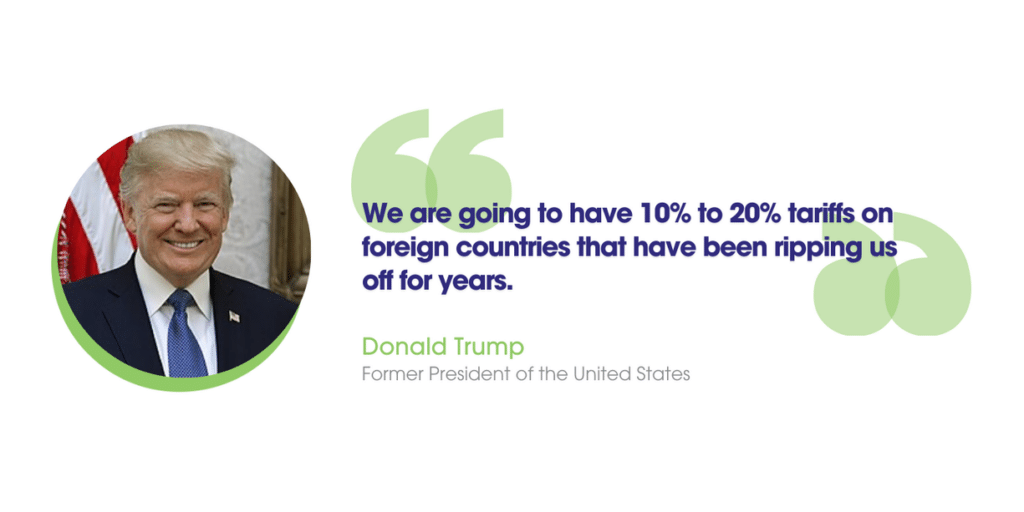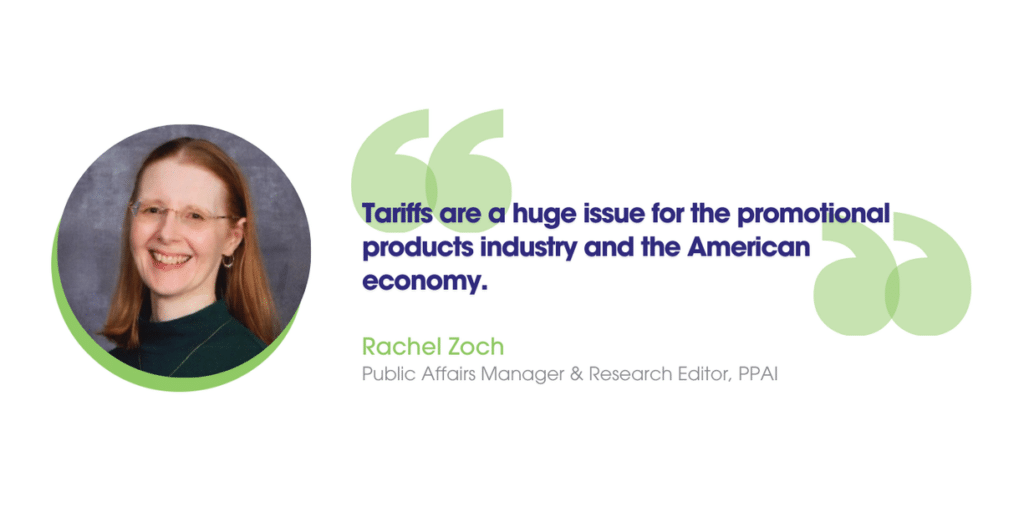At a North Carolina rally during former President Donald Trump’s campaign, the Republican got into his foreign policy plans for a potential second term that could have significant relevance for promotional products companies.
While asserting his “America First” rhetoric, Trump brought up his intention to impose new tariffs if elected, taxing imports from certain countries as a way to punish those countries for bad faith trade dealings or national security or to incentivize domestic manufacturing.

“We are going to have 10% to 20% tariffs on foreign countries that have been ripping us off for years,” Trump told his supporters. “We are going to charge them 10% to 20% to come in and take advantage of our country because that is what they have been doing.”
- Trump did not specifically make clear which countries he was referring to, but during his first term, he imposed significant tariffs on many imports from China in 2018.
Promo Perspective
In theory, foreign tariffs can create more resilient domestic manufacturing, but they have also been known to cause immediate pain to U.S. businesses that require certain imports.
- The nonpartisan Tax Foundation estimates the impact of tariffs levied in 2018 and 2019 at $80 billion, calling it “one of the largest tax increases in decades.”
“Tariffs are a huge issue for the promotional products industry and the American economy,” says Rachel Zoch, PPAI’s public affairs manager and research editor. “PPAI has long opposed import duties, which are tantamount to taxes that adversely impact businesses and consumers.”

Earlier this year, Ben Zhang, president and CEO of Greater Pacific – ranked the No. 68 supplier in the PPAI 100 – told PPAI Media that the entire promo supply chain suffers when tariffs are introduced.
“We have to build the tariff cost into our price and pass it onto our customers,” Zhang said. “Suppliers pass it onto distributors, who then pass it onto end users.”
Reacting to the Biden administration building upon Chinese tariffs originally put in place by Trump, Thomas Goos, MAS, president of Image Source – PPAI 100’s No. 47 distributor – said in May that such moves are a net negative for the growth of promo.
“This industry relies on significant manufacturing in China,” Goos said at the time. “There will be increased costs from these new tariffs, and we could lose sales. It’s not good for our industry.”
If tariffs as high as 20% were to be implemented in the next presidential term, it would require certain promo companies to nimbly and swiftly reconsider where they are sourcing products and materials from.
- Bangladesh had seemed a logical move for many apparel companies trying to move away from China, but recent political unrest has caused disruption to the country’s supply chain.
- Recently, the president of a promo association in Turkey claimed the country is looking to capitalize on the U.S. promo market’s desire to find import alternatives.
Where Might A Harris Administration Land On Foreign Tariffs?
Vice President Kamala Harris has not made as bold of claims as Trump on the topic of foreign tariffs up to this point in her campaign.
- The most significant tariffs imposed in recent years came by way of Trump’s office via Section 301 Chinese tariffs, in what many considered to be a trade war with China.
- However, it is important to note that President Joe Biden has not undone those tariffs. In fact, in May, his office increased aspects of those Chinese tariffs.
Harris, of course, is vice president to the administration that has not provided relief from those tariffs in the past four years. Many U.S. businesses would likely be interested in how far she differs in opinion on the subject, not only from her opponent, but from President Joe Biden.
Zoch suggests it may be one area where Harris is willing to show a gap between her and the man who tapped her as vice president.
“One could infer from her emphasis on reducing consumer prices that she would be open to ending or reducing the Section 301 tariffs,” Zoch says.


